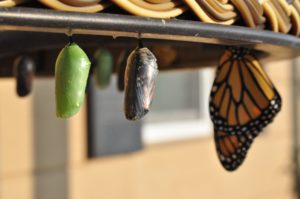Change and Growth

Photo by Suzanne D. Williams on Unsplash
As I write this, I’m getting ready to tell the world “I wrote a book!” It’s one thing to have an idea and something entirely different to write the book. And it’s definitely a third thing to decide to self-publish – something I know nothing about. Of course, there is no shortage of resources available online to tell you everything you need to do to publish and market your book. But sometimes, all that help is more intimidating than helpful. At one point, I had to leave my desk and go for a walk. I couldn’t imagine how in the world I would do it all. Why in the world had I thought this was a good idea? Is it imposter syndrome when you really don’t know what you are doing?
Imposter Syndrome
Imposter syndrome is “a belief that you’re an inadequate and incompetent failure, despite evidence that indicates you’re skilled and quite successful.” https://www.fastcompany.com/40421352/the-five-types-of-impostor-syndrome-and-how-to-beat-them My experience was a great example of the idea that imposter syndrome can be a sign of growth and change. In the middle of it all, I had doubts about my ability to accomplish what I had set out to do. And then there were the moments when my ego took over and I started worrying about whether or not the book was any good. It would have been easy to talk myself out of moving forward. And that’s the danger of the imposter syndrome, that we let those feelings of discomfort and stress discourage us from trying new things. It can stop people from speaking up in meetings or sharing ideas. Or trying something new when we don’t know all the steps we’ll need to complete.
Reverse Imposter Syndrome
A few years ago, I told a friend I thought I had Imposter Syndrome backward. I thought if I was doing it, (whatever ‘it’ was) it meant it was no big deal. It was just what needed to be done, what anyone would do. But like the more usual experience, it was still a way of doubting my skills and abilities. And it was just as limiting as it kept me from understanding the value of the work I was doing.
This leads us to the question of change and growth. If we don’t understand our own abilities or recognize our accomplishments, it limits our imagination which limits our possibilities for growth. Our ability to accurately evaluate our situations and our skills supports our ability to learn, grow and change. Next time you find yourself facing imposter syndrome – whichever way you experience it, remind yourself that the discomfort is an opportunity, a signifier that it is an opportunity for growth. I’ve found the reframing to be helpful personally and in working as a coach. After all, Wayne Dyer was correct –
“If you change the way you look at things, the things you look at change.”
Try reframing that feeling of humbug into a sign that you are growing and changing and see what changes. Try for Hey, Humbug! rather than Bah, Humbug!
